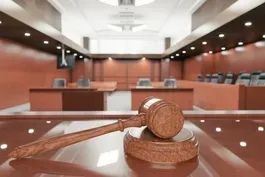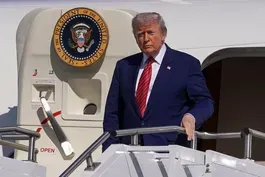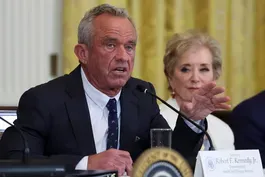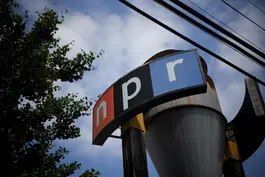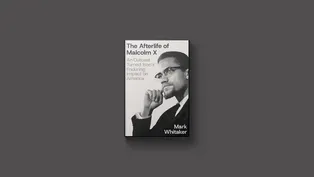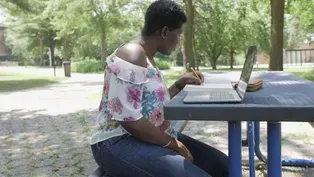
U.S.-backed Gaza aid system quickly overwhelmed
Clip: 5/27/2025 | 10m 25sVideo has Closed Captions
New U.S.-backed aid distribution system in Gaza quickly overwhelmed
The new aid distribution system in Gaza was quickly overwhelmed by Palestinians who for 11 weeks have been blocked from assistance. The Gaza Humanitarian Foundation, backed by the U.S. and Israel, says the old UN-led system allowed Hamas to flourish. But humanitarian groups say the new system is incapable of alleviating the suffering of Gazans. Nick Schifrin discussed more with Ciarán Donnelly.
Problems with Closed Captions? Closed Captioning Feedback
Problems with Closed Captions? Closed Captioning Feedback
Major corporate funding for the PBS News Hour is provided by BDO, BNSF, Consumer Cellular, American Cruise Lines, and Raymond James. Funding for the PBS NewsHour Weekend is provided by...

U.S.-backed Gaza aid system quickly overwhelmed
Clip: 5/27/2025 | 10m 25sVideo has Closed Captions
The new aid distribution system in Gaza was quickly overwhelmed by Palestinians who for 11 weeks have been blocked from assistance. The Gaza Humanitarian Foundation, backed by the U.S. and Israel, says the old UN-led system allowed Hamas to flourish. But humanitarian groups say the new system is incapable of alleviating the suffering of Gazans. Nick Schifrin discussed more with Ciarán Donnelly.
Problems with Closed Captions? Closed Captioning Feedback
How to Watch PBS News Hour
PBS News Hour is available to stream on pbs.org and the free PBS App, available on iPhone, Apple TV, Android TV, Android smartphones, Amazon Fire TV, Amazon Fire Tablet, Roku, Samsung Smart TV, and Vizio.
Providing Support for PBS.org
Learn Moreabout PBS online sponsorshipAMNA NAWAZ: Welcome to the "News Hour."
There is a new aid distribution system in Gaza, and, today, it was quickly overwhelmed by Palestinians who for 11 weeks have been blocked from international assistance.
GEOFF BENNETT: The Gaza Humanitarian Foundation is backed by the U.S. and Israel, which says the old U.N.-led distribution system allowed Hamas to flourish.
But humanitarian groups today said the new system was incapable of alleviating the suffering of two million people and could be used to help Israel forcibly move the population.
Nick Schifrin reports.
NICK SCHIFRIN: This is what aid distribution in Gaza now looks like, with Israeli warning shots in the distance, the hungry grab boxes designed to feed a family of five for three days with pasta, rice, cooking oil, beans, and tomatoes.
MAN (through translator): These boxes provide somewhat of a solution to the crisis.
It has been over 88 days since the crossings were closed and we are suffering from a great famine.
MAN (through translator): We are dying of hunger.
The children are saying: "Father, I want to eat."
So I want to sell even my blood to feed them.
NICK SCHIFRIN: Humanitarian officials have been warning against these sites because they funnel and screen the desperate into small areas.
They are also secured with private American contractors and the Israeli military, today's warning shots apparently injuring at least three.
Even the group's initial head quit this weekend because he said the effort couldn't be done with humanity and impartiality.
But Israel says these sites are necessary because Hamas has stolen U.N. aid to maintain its military capacity, an accusation the U.N. denies.
BENJAMIN NETANYAHU, Israeli Prime Minister: The idea is basically to take away the humanitarian looting as a tool of war of Hamas, to give it to the population, eventually to have a sterile zone in the south of Gaza, where the entire population can move for its own protection.
NICK SCHIFRIN: The Israeli military has enlarged what it calls a buffer zone along the Gaza border, a corridor that bisects Gaza, and this weekend launched what it called an unprecedented attack through Khan Yunis, Gaza's second largest city, toward the sea.
The military says it has operational control of at least 40 percent of Gaza, and the government vows to control all of Gaza, in part by creating and securing the new aid distribution points in Southern and Central Gaza.
But after 11 weeks of blocked aid, this is hunger in Gaza.
Food has become so rare, Islam Abu Taeima and her daughter can only find it in the trash.
Half-a-million Gazans are extremely food-insecure and on the verge of famine.
Abu Taeima admits eating what one family discarded might make her family sick, but she says it's better than letting them starve.
ISLAM ABU TAEIMA, Gaza City Resident (through translator): As you can see, we're here as stray dogs collecting food from the trash.
I swear this is our life day-to-day.
We collect food every day from garbage.
If we don't gather anything, then we don't eat.
NICK SCHIFRIN: Israel hopes the new pressure forces Hamas to release all of the nearly 60 Israeli hostages it still holds, including 20 believed to be alive.
The military campaign features punishing airstrikes, including one that Palestinian officials say killed nine of Dr. Alaa al-Najjar's children.
They were from 7 months to 12 years old.
Palestinian rescue officials say they were all killed by an airstrike that Israel says targeted Hamas fighters.
The husband survived, now in critical condition at the very hospital where she works as a pediatrician and where their sole surviving son is recovering.
In recent days, Israel's closest allies have called for the war to end.
DONALD TRUMP, President of the United States: Israel, we have been talking to them, and we want to see if we can stop that whole situation as quickly as possible.
NICK SCHIFRIN: And to discuss the implications of this new American-backed aid initiative, we turn to Ciaran Donnelly, senior vice president at the International Rescue Committee, an aid organization.
He joins me from New York.
Ciaran Donnelly, thank you very much.
Welcome to the "News Hour."
You saw the scenes that unfolded today in Rafah in Southern Gaza as the Gaza Humanitarian Foundation began to deliver aid for the first time.
What is your response to what happened today?
CIARAN DONNELLY, Senior Vice President, International Rescue Committee: The chaotic scenes that we have seen in Rafah today really just bear out the warnings that the IRC and other humanitarian agencies have been putting out for the last number of weeks around this Israeli-led aid initiative.
The situation in Gaza is dire, as you know.
There's over two million people who are living in acute food insecurity.
That means they don't have enough food for themselves and their families.
There's almost 500,000 of those people who are living in catastrophic -- that's famine-level -- food insecurity.
Our teams on the ground are saying families of five and six people are sharing a single piece of bread among themselves as a meal before they go to bed every night.
So it's a really dire situation.
Now, there are solutions to this, scaling up aid at the speed and volume that's needed, but doing that requires working with the humanitarian community on the ground, organizations like ours that have the experience and expertise to be able to deliver aid in conflict environments in ways that are transparent, safe, accountable, ways that respect the dignity of the people receiving aid.
But the ways in which this new initiative have been developed have essentially left us excluded from the design of it and unable to work on the ground and deliver the programs that we most desperately need to be able to do.
NICK SCHIFRIN: So, the Gaza Humanitarian Foundation does say that it is trying to adhere to the same values that you just described.
And it says they have distributed 460,000 meals so far and hope to deliver three million meals over the next 90 days.
Is that enough?
CIARAN DONNELLY: So, it's a drop in the ocean.
But, equally, the way that that aid is being distributed through a limited number of distribution sites that force people to walk for miles through dangerous and difficult terrain, risking the exclusion of the most vulnerable, those who can't make it, it excludes organizations from being able to monitor how the aid is being used after it's distributed.
It also means that people can only access a very limited scope of services.
They can receive items that they can take away and distribute.
But in the context of Gaza, with the situation as dire as it is after months of war and devastation, people need a much more expansive set of services.
If you want to treat kids for acute malnutrition, you don't just give them specialized food supplies.
You have to monitor their recovery.
You have to be there with their families.
You need a community-based approach to aid distribution, one that's run independently and impartially, to be able to effectively support populations to survive and to recover in a situation like this.
NICK SCHIFRIN: Israel says that these sites are necessary and something like the Gaza Humanitarian Foundation that some Israeli officials have been working on for more than a year is necessary because Hamas steals the aid in order to sell and convert into military capacity.
What's your response to that Israeli concern?
CIARAN DONNELLY: So the IRC and our partners and peers in the humanitarian community have been working across Gaza for over a year now to deliver vital humanitarian relief.
We deployed all of our best efforts to scale up during that brief cease-fire.
Unfortunately, we have seen a complete halt to access to Gaza for aid and supplies during the Israeli blockade over the last 2.5 months.
What our teams have reported on the ground is that they have not observed any systematic diversion by any group operating in Gaza.
What we have seen are examples like we saw today of desperate people looting supplies to take care of themselves and their families.
That's the extent of what we have reported.
Now, the best mitigation for that kind of risk is to work with aid agencies like ourselves, like the U.N. infrastructure on the ground that have the experience and the capability honed over decades and conflict zones around the world to be able to work effectively and safely in these places.
NICK SCHIFRIN: But, in some ways, if this is the structure that Israel is demanding, why not as an international humanitarian aid organization back this structure if this is what the government of Israel requires in order to feed two million people?
CIARAN DONNELLY: The starting point for our work as a humanitarian organization is a very simple principle.
First, do no harm.
And a simple test for whether or not this distribution mechanism can do more good than harm hasn't yet been met.
The way that it's been organized, with limited distribution sites, forcing people to concentrate themselves in fundamentally undignified and inhumane conditions to receive food, just simply doesn't meet that very basic test for good humanitarian work.
We stand ready to work with any group in any place in the world that we work in that's committed to delivering effective and principled humanitarian assistance.
And we call on anyone with influence in the region and, in particular, the Israeli government to establish a mechanism for a good faith dialogue with the humanitarian community around how best to distribute effective, safe, transparent and dignified aid in Gaza.
But this structure doesn't meet that test.
NICK SCHIFRIN: Finally, in the time we have left, the IRC has been working on the ground in Gaza since this war began.
What is the scale of the humanitarian crisis after what ended up being more than 11-week block on aid deliveries?
CIARAN DONNELLY: It's absolutely unprecedented.
There are certainly crises around the world that have larger numbers of people affected, but I can't think of a single country that has the level of people, the entire population of Gaza, 100 percent of the people there, living in acute crisis levels of food insecurity.
People just don't have enough food to eat.
They struggle for access to basic services.
We have pallets of nutrition and food and other supplies waiting to get in.
We can't get access for our supplies to get in.
The same is true of the U.N. and other partners.
And so we are being effectively prohibited from delivering the humanitarian assistance that is so vitally needed on the ground.
NICK SCHIFRIN: Ciaran Donnelly of the International Rescue Committee, thank you very much.
CIARAN DONNELLY: Thank you.
Calls grow for judges to control their security force
Video has Closed Captions
Clip: 5/27/2025 | 6m 45s | As Trump lashes out against courts, calls grow for judges to control their security force (6m 45s)
A look at Trump's controversial pardons for loyalists
Video has Closed Captions
Clip: 5/27/2025 | 7m 16s | A look at Trump's controversial pardons for political allies and loyalists (7m 16s)
News Wrap: CDC changes COVID shot recommendations
Video has Closed Captions
Clip: 5/27/2025 | 4m 56s | News Wrap: CDC no longer recommends COVID shots for healthy children and pregnant women (4m 56s)
NPR CEO on suing Trump over order targeting funding
Video has Closed Captions
Clip: 5/27/2025 | 7m 3s | NPR CEO discusses suing Trump administration over order targeting funding (7m 3s)
'The Afterlife of Malcolm X' examines his lasting impact
Video has Closed Captions
Clip: 5/27/2025 | 6m 47s | New book 'The Afterlife of Malcolm X' examines his lasting impact on civil rights (6m 47s)
University of the People offers affordable college education
Video has Closed Captions
Clip: 5/27/2025 | 8m 58s | University of the People offers students a new and affordable college experience (8m 58s)
Providing Support for PBS.org
Learn Moreabout PBS online sponsorshipSupport for PBS provided by:
Major corporate funding for the PBS News Hour is provided by BDO, BNSF, Consumer Cellular, American Cruise Lines, and Raymond James. Funding for the PBS NewsHour Weekend is provided by...
